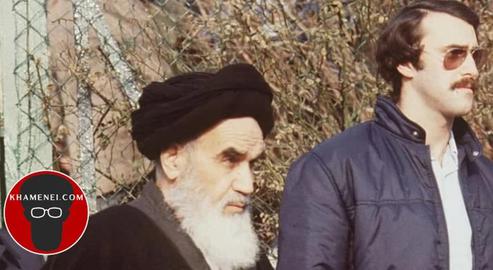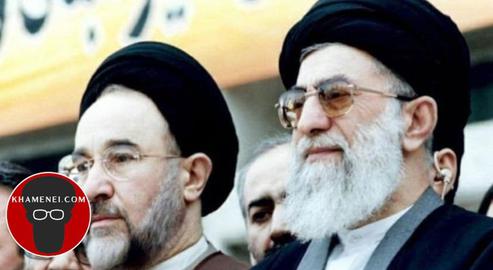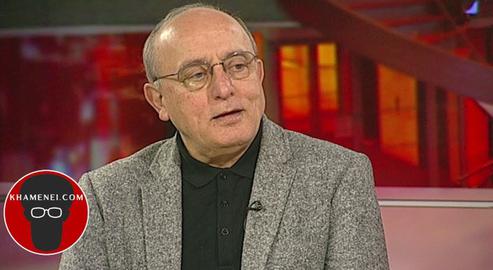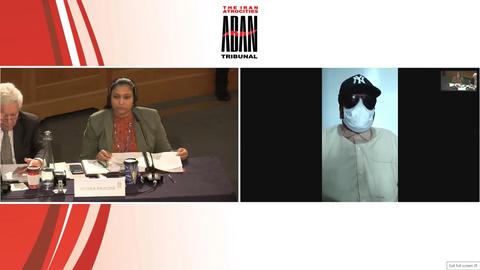In 1978, shortly before the Islamic Revolution, Ayatollah Ruhollah Khomeini was living in exile in Neauphle-le-Château, Paris. Mohsen Sazegara was one of his companions then, and was later given important positions after the Islamic Revolution. After Khomeini was succeeded by Ayatollah Ali Khamenei, however, he gradually lost faith in the regime. He wrote critical letters to Khomeini and paid the price: arrest, imprisonment and ultimately, having to flee his country of birth.
***
In the first decade after the 1979 Islamic Revolution, Mohsen Sazegara was appointed to a number of high-level roles in the government of the Islamic Republic. He was a founder of the Revolutionary Guards, managing director of the National Radio of Iran, deputy minister of heavy industries, chairman of the Industrial Development and Renovation Organization of Iran, and vice minister for planning and budgetary affairs. But he only truly came to the public’s attention in the 1990s, as the publisher of several reformist newspapers.
In a recent interview with IranWire, Sazegara revealed that in 1990, one year after Ali Khamenei succeeded Khomeini as Supreme Leader, he wrote to the former demanding fundamental reforms. After that, he also sent him two other, again private, letters.
Sazegara gradually became more critical of Khamenei from there. A year after he was disqualified as a candidate for the 2001 presidential election, he wrote another letter to the Supreme Leader, this time an open one, and criticized his leadership. The Islamic Republic, he wrote, was “irredeemable” and its constitution “out of tune with the modern world”. “This constitution is not going to give birth to democracy and people’s sovereignty,” he said in an interview with Radio Farda.
The current constitution allows for no change, Sazegara wrote in February 2003. At the time, Mohammad Khatami was president and Sazegara also criticized the reformist movement’s “passivity”. He asked: “If the judiciary is committing transgressions, then why do they not use government resources and call on the people to stand up [to them]?”
On February 18, 2003, Sazegara was arrested by the Intelligence Ministry at his home. He had only recently undergone heart surgery, immediately went on a hunger strike and was released after five days.
His detention coincided with elections for the city councils. His friends created a new organization, the National Coalition of Freedom Seekers, and announced Sazegara as their candidate for mayor. The group printed posters that said: “Our mayor is in prison.”
At the same time, a delegation from the United Nations Commission on Human Rights was visiting to investigate the situation in Iranian prisons, and to examine the issues of arbitrary arrests and prisoners of conscience. The UN delegation’s visit prompted the regime to grant Sazegara early release.
Calling for “Profound Change” in the Constitution
The spring of 2003 saw a series of student protests break out in Tehran. They were met with the same violence by thugs and plainclothes security agents as similar protests had been in 1999. On June 15, 2003, Sazegara was arrested again, and the judiciary announced he had been involved in the protests.
Amnesty International, however, reported that Sazegara was arrested after publishing an article on his website calling for a “profound change of the constitution”. His son, Vahid Sazegara, was detained along with him before being released on July 9.
Amnesty wrote at the time: “Ever since his arrest, Mohsen Sazegara has been detained at Evin prison, reportedly without charge, and has been denied regular access to his lawyer and family. He reportedly carried out a 54-day hunger strike, taking only water. He was transferred on four occasions to Baghiyyatollah Hospital in Tehran.”
In interviews and repeated letters, Sazegara’s family expressed their urgent concerns about his deteriorating health in prison. On October 4, 2003, his parents Mohammad Ali Sazegara and Aghdas Anisi Tehrani wrote that if they were not informed soon about the state of his health, they would file a complaint with international bodies. Then in a speech to parliament, Isfahan MP Rajab Ali Mazroui warned that Mohsen Sazegara was in danger of meeting the same fate as Zahra Kazemi, the Iranian-Canadian journalist who had been killed in custory in July 2003.
Sazegara was released after 114 days in detention, 56 of them spent in solitary confinement. He had suffered from heart, vision and digestive problems behind bars and had been transferred to Baghiyyatollah Hospital five times.
Mohsen Sazegara left Iran in the autumn of 2003 for medical treatment in the UK. He did not return. In 2005 he was tried in Iran in absentia and sentenced by the Revolutionary Court to seven years in prison. His son Vahid was also tried for “acting against national security” but the court never issued a verdict.
Hold a Referendum or Resign
Exile did not stop Sazegara from writing letters to the Supreme Leader of the Islamic Republic. In another open letter to Khamenei in 2005, he asked him to hold a free referendum on his legitimacy, or resign as the Supreme Leader.
“Let go of these strange thoughts of yours that the whole world is run by an invisible executive board,” he wrote, “and that this board – in your words, ‘the enemy’ – works day and night... and conspires and plots against you, the Islamic Republic, or religious rule. All the people and governments of the world are busy with their own lives and work. Iran occupies a very small part of their time.
“Working in the direction of amity with the world and looking after the Iranian nation’s interests, peace, and reconciliation will help this suffering nation to have a moment of tranquility... after twenty-seven years. But making friends with the world has some prerequisites, such as democracy and human rights.
“I know that in your heart, you are laughing at what I am saying. You are, unfortunately, drunk with power. You think that you are riding the crest of the wave of fortune and that you have eliminated your opponents. You are mistaken. The inevitable result of continuing down the current path is clear. It has happened many times in the history of Iran and of the world. It is not too late for you to work together with the people in order to cease inflicting damage on the country.”
Then in June 2017, while Khamenei was in hospital for prostate surgery, Sazegara advised him to judge himself now instead of waiting to be judged on Judgement Day.
For 30 years years, Sazegara has written and issued statements calling for change to the Iranian system of governance. In February 2018, he joined a group of 15 civil and political activists and figures inside and outside Iran in calling for a referendum to decide on the country’s political future.
Describing the Islamic Republic as “incapable of reform”, the statement prescribed instead “a secular, parliamentary democracy based on free popular elections, the thorough observance of human rights, and eradication of all institutionalized discriminations, especially [those preventing] the complete equality for women, ethnic groups and religions in all cultural, social, political and economic fields.”
It went on: “The regime has become the main obstacle in the way of the Iranian people’s progress and liberty by hiding under a theological shelter, and through abusing religion, lying, duplicity, opacity, ignoring public opinion, spurning the rule of law and the principles of human rights, institutionalized violations of freedom and people’s rights, utter incapability to solve political, economic, social and cultural crisis, and closing all the doors to legal oversight and peaceful reform.”
Other signatories to this statement were:
- Nasrin Sotoudeh, lawyer and human rights activist
- Shirin Ebadi, Noble Peace Prize laureate, lawyer and human rights defender
- Narges Mohammadi, human rights activist
- Payam Akhavan, lawyer, professor of law and a member of the Court of Arbitration at the Hague
- Jafar Panahi, film director
- Mohammad Seifzadeh, lawyer, former judge and human rights activist
- Hassan Shariatmadari, opposition politician and pro-democracy activist
- Heshmatollah Tabarzadi, journalist and pro-democracy activist
- Abolfazl Ghadyani, reformist activist
- Mohsen Kadivar, philosopher and reformist activist
- Kazem Kardavani, sociologist
- Mohsen Makhmalbaf, film director
- Mohammad Maleki, academic and pro-democracy activist
- Mohammad Nourizad, filmmaker, former journalist and human rights activist
Related coverage:
'May the Mavericks Cut My Head Off': The Lawyer Who Took On Khamenei
The Journalist Jailed for 13 Years for Furious Letters to Khamenei
Poisoned Letters: The Firebrand Killed in Prison for Writing to Khamenei
Iranian Lawyers, Activists Discuss Suing the Supreme Leader
Imprisoned Lawyers: Why We Planned to Sue the Supreme Leader
Khamenei’s War on Democracy and Civil Society
The Overnight Ayatollah: Khamenei's Fight to Become a Spiritual Leader
Why is Khamenei Still Trying to Prove his Legitimacy as Leader?
visit the accountability section
In this section of Iran Wire, you can contact the officials and launch your campaign for various problems



























comments